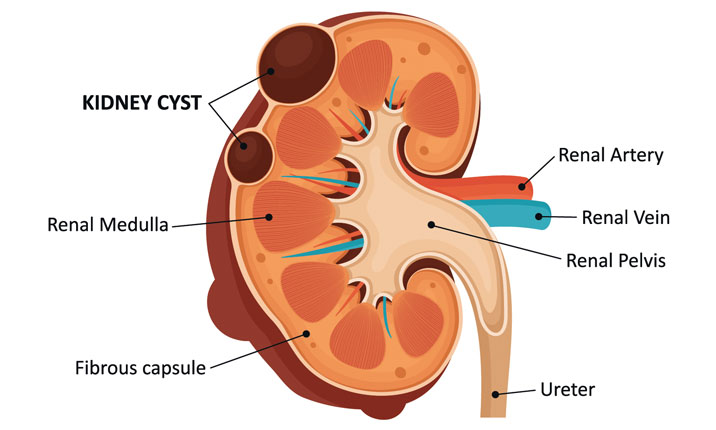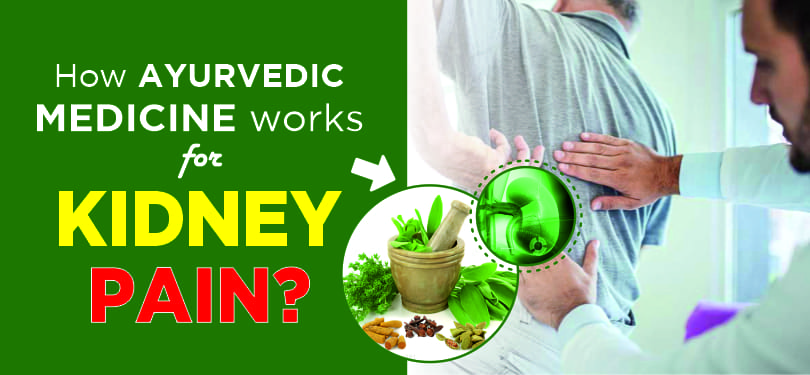Kidney pain also called renal pain is the pain that may occur due to any injury, impairment, or infection of the kidneys. Kidneys are the organs look-alike bean and equal to the size of the average human fist. The organs mainly lie on both sides of your spine and mainly do the work of filtering blood and excreting wastes and poisonous substances from the blood and maintain the level of electrolytes in the body.
The pain in the kidney can be described as dull or throbbing or sharp and sometimes severe, depending upon the underlying cause. Sometimes people are confused between kidney pain and back pain. But the sensation in kidney pain is deeper and located higher on the upper back below your ribs.
Kidney pain can be called unilateral if your one kidney has a problem. It is called bilateral if both kidneys are affected. It can give you a clue to differentiate among intrinsic, pre-renal or post-renal. Modern medicines have especially pain killers to manage this pain. However, the best herbal treatment for a kidney in Ayurveda can better cure this kidney disorder.

Factors responsible behind kidney pain
Kidney pain may be due to several reasons but mainly an infection, trauma, obstruction or cyst growth can be responsible. Apart from, here are some major causes of kidney pain that are described below;
Kidney infection
Kidney infection is called pyelonephritis which is usually caused by bacteria and can affect one or both kidneys. Acute pyelonephritis is a kidney infection type that occurs suddenly. The recurrent cases are referred to as chronic pyelonephritis.
Pyelonephritis usually occurs due to an infection that travels from the lower urinary tract, including the ureters, bladder or urethra.
Acute pyelonephritis can often take place over two days. When it comes to the symptoms of the disease, it includes;
- Unilateral or bilateral kidney pain; commonly blunt & intense
- High fever
- Body chills
- Nausea and vomiting
- Fatigue
- Painful or burning sensation
- Cloudy urine with a fishy smell
- Blood in urine
- Increased urge to urinate
Chronic pyelonephritis is often less intense, and patients may have no symptoms in some cases. If someone develops symptoms, he may notice a dull ache in the flank accompanied by malaise and a low-grade fever.

Kidney Trauma
Kidney trauma occurs due to a severe impact or a penetrating wound that lacerates one or both kidneys. Due to the kidneys’ vulnerable position in the abdomen, such injuries are not uncommon.
Around 10% of the abdominal injuries will sustain damage to the kidneys. Road accidents, physical assaults and serious falls are mainly responsible for most of the renal traumas. The challenge with such injuries is that they are not often clearly symptomatic. In comparison, some may get pain that may be dull instead of specific. In general, you may or may not be a sign of skin bruising or physical injury.
Some other symptoms may include fever, blood in urine, problem in urinating, decreased alertness, abdominal pain and swelling, etc. These symptoms require immediate treatment.
Obstruction in kidneys
Any obstruction in the kidneys for prolonged can be responsible for kidney pain. Its treatment may involve antibiotics to resolve an infection, nephrostomy or surgery if a stone doesn’t pass on its own. Moreover, severe hydronephrosis may require percutaneous nephrostomy, a procedure where a tube is inserted through your back to drain the kidneys directly. A ureter stent may also be used during cystoscopy to clear a blocked ureter. Some other treatment may be required to identify the underlying cause.

Renal Tumors or Cysts
Your kidneys may have tumors or cysts sometimes. Tumors are severe, while cysts may also be serious if they are not simple cysts. Be it tumors or cysts, they keep increasing with time and cause kidney pain when affecting kidneys’ health severely. Their treatment varies depending upon the causes of the cysts and tumors.
Cancer therapy and treatment kidney in Ayurveda is used to cure renal tumors or cysts, respectively.
How can kidney pain be detected?
Kidney pain in your kidney area can be detected with physical examination and some medical tests, including;
- A blood test
- A urine test
- An ultrasound
If you have history of kidney stones, you may need to follow a Computerized Tomography (CT) scan. But your doctor will suggest CT Scan only if it is necessary.
How can kidney pain be treated?
Kidney pain treatment depends upon the underlying cause and severity of kidney pain. If your kidney pain eases with medicines like paracetamol. Consult your doctor or physician.
If your kidney pain results from any kidney disease, it’s necessary to see a kidney doctor. In case of pregnancy, you have kidney pain, take the help of a kidney doctor immediately.
The Allopathic doctor or nephrologist can help you manage kidney pain with some medicines depending on your problem. But this modern treatment has many complications and symptoms associated with it. It uses drugs or chemicals containing medicines that may cause serious side effects on your health. For severe cases of kidney disease, your nephrologist may use dialysis and kidney transplant, which are complicated treatment methods that help manage kidney complications. But these methods can’t provide a permanent cure as they don’t work on the roots of the disease.
In contrast, if you choose the best treatment for a kidney in Ayurveda, you can get a permanent cure to the problem.

Best treatment for a kidney in Ayurveda
Ayurveda is a restorative treatment that acts upon the roots of the disease to provide a permanent cure. It mainly relies upon herbal medications, natural therapies and some dietary and lifestyle alternations as their treatment methods and procedures.
Ayurvedic treatment for kidney pain identifies the roots of the problem and then suggests a personalized treatment depending upon the patient’s physical complications, age, gender and complications. The holistic treatment aims to remove complications and symptoms and then to restore and rejuvenate the affected organ.
If kidney disease is the condition responsible for kidney pain, treatment kidney in Ayurveda uses herbal medicines, natural therapies and some dietary changes to overcome the problem by lessening complications and healing kidneys naturally. For other conditions, it suggests treatment accordingly. The best thing about treatment kidney in Ayurveda is that it’s free from any risk and have no side-effects associated with it.
Choose the best Ayurvedic kidney hospital that provides Ayurvedic medicines for kidney pain!

